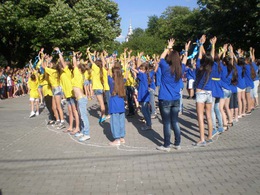Now he didn’t have the internet, but I imagine the arrival of Jesus and the followers felt a little like a flash mob to those unsuspecting communities they met along the way. And I bet the impact was very similar. A message of Good News in the middle of everyday life. Can you imagine the emotional experience that must have been for both the given and the receiver?
“What happened to us as a church?” asked Greta Conrads, a young adult from the community I serve. “The church in Jesus day seemed to be fun and free and risky. I want to see more of that”.
I hear plenty of pastors and leader tell me that they don’t have enough youth in their church to have a youth group – let alone a flash mob. Our young people, such as Greta, aren’t worrying about numbers. They are the voice of Jesus asking us: why are we here? What have we done today? They are the spirited disciples waiting, eager, to be called.
So how do we call them? In my conversation with youth, they tell me:
Don’t take attendance: Our youth have a lot going on, and if they want to play hockey or sing in a community choir, that means they will probably miss church on occasion. It’s not how often they come that matters to them – it’s what they do when they are here. And it doesn’t have to be happen only on Sunday morning.
Don’t make them sit there: It’s amazing what happens every time I ask a young person to read in church, or serve as acolyte or worship assistant, or perform an anthem, and even preach a sermon. They say yes.
Value them: Youth tell me that sometimes they feel like they are members-in-waiting, holding the place for their adult selves. They are secondary voices at annual meetings, or Christmas pageant performers. Don’t underestimate the power of engaged and energetic youth – even a small group of youth – to inspire the rest of us. To lead us forward in the gospel.
Teach them: It is not enough to say, “Do the right thing, be a good person.” That’s not where Jesus stopped the conversation. Jesus was a practical and strategic leader. Our youth want those same skills. It’s not useful to urge them to stand up to bullying, for instance, if we do not give them the steps to do so. Jesus, for instance, surrounded himself with the disciples, and as a group they spoke against what they knew was wrong in society. Our youth can learn do the same: to rally their friends to confront the bully. They can learn public speaking, how to foster positive mental health, how to manage their digital lives. In this way, the church takes on the responsibility of training the next generation of leaders – not just the next generation of Lutherans.
Be as bold as a Flash Mob: Last year, the confirmation class at Saint John, Ottawa showed up unexpectedly at a senior’s residence and performed a play. It was their idea: a spontaneous gift to some lonely people who don’t see many youth. It was huge hit with the residents. This Fall a student ministry group at the University of Ottawa called Open Table have other plans: to go to the market and hand out pieces of pie to the homeless, just to brighten someones day. Our young people live in an age where time moves quickly, and they don’t want to sit around in committees all day. They want to be a part of something that makes the world a better place, one random act of generosity at a time.
Our young people travel effortlessly in a society where one well-placed tweet on Twitter or one strategic video on YouTube can make millions pay attention. They already recognize the power of a small group of risk-takers to move a crowd, to get everyone singing the Hallelujah chorus. It’s time we let them teach us. After all, it’s boring on the sidelines.

 RSS Feed
RSS Feed
